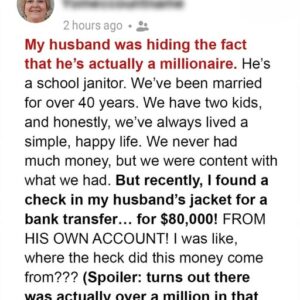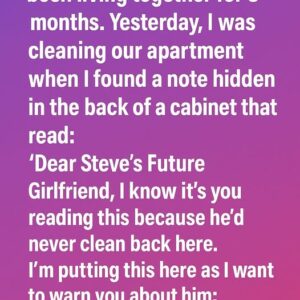The courtroom chair was cold and unforgiving, the kind of detail you notice when you’re trying not to shake. I kept my hands folded like the obedient wife Benjamin always preferred. He sat across the aisle with his legal entourage, suit razor-sharp, smile smug enough to cut glass. He leaned toward me just before the hearing started, voice low and performative. “You’ll never touch my money again.” The same tone he used when he decided I no longer needed my own credit card, when he made me ask permission to buy groceries.
Behind him sat Veronica—flawless makeup, designer purse, lips curved in a knowing smile. “That’s right, sweetheart,” she murmured. She called him what I used to. Next to her, Benjamin’s mother, Dorothy, watched me like I’d scuffed her marble floors. She never liked me—wrong background, wrong polish, wrong everything for the Foster family brand.
“She doesn’t deserve a cent,” Dorothy said to no one in particular, as if she were commenting on the weather. She’d been auditioning replacements for years. Veronica, apparently, had the role.
My lawyer, Mr. Peterson, looked like a man who’d slept in his car—nervous, papers trembling. Across the aisle, Benjamin’s team was a glossy wall of confidence. They had binders, bullet points, and a plan to paint me as a pampered nonentity: no job, no assets, no value. The judge, Hawkins—steel eyes, steady voice—listened without flinching.
“Your Honor,” Benjamin’s lead attorney began, “my client has been more than generous. Mrs. Foster lacks meaningful work history, holds no independent assets, and contributed nothing to the household income. A modest monthly allowance is fair.”
I could have laughed. No work? I’d managed his calendar, hosted his business dinners, ran a house that doubled as a showroom for his ambitions. No education? I had a marketing degree I’d mothballed because he insisted “we” didn’t need my salary. No assets? He made certain of it, corralling every dollar into accounts I couldn’t touch. Still, I stayed silent. Sometimes a good strategy looks like surrender.
Benjamin turned to enjoy my silence. He thought I was broken. He’d been moving money and hiding purchases for months, confident I’d never notice. He was wrong.
When their side finished preening, Mr. Peterson stood, throat tight. “Your Honor, one final exhibit.” He slid a plain white envelope to the bailiff. “A letter from Mrs. Foster.”
Benjamin’s attorneys pivoted as if someone had pulled a fire alarm. This wasn’t on their script. Hawkins opened the envelope, unfolded the pages, and read. At first, her face was unreadable. Then her eyebrows rose. Then she bit back a smile. Then, to the absolute horror of the Foster row, Judge Hawkins laughed—an honest, shoulder-shaking laugh. She had to take off her glasses to wipe her eyes.
“Oh, this is good,” she said, voice dry but bright. She looked at Benjamin, then at Veronica, then at Dorothy. “Very good indeed.”
Their confidence vanished like a switch had flipped. Benjamin went pale. Veronica’s mouth slackened. Dorothy’s composure cracked. I let myself breathe.
Three years earlier, I’d thought I was living the dream. Benjamin brought flowers, kissed me like we were still dating, told me I was his luck. We lived in his family’s white-columned house on Maple Street, every inch curated to prove how perfect we were.
“You don’t need to worry about money,” he told me over dinner, knife and fork moving with etiquette-class precision. “I make enough for both of us. Focus on our home.”
I had a job then—a small marketing firm downtown. I liked the work. It paid bills, built skills, gave me a life that wasn’t just catered dinners and paint swatches. But he chipped away gently. “Your little salary doesn’t matter,” he said once, smiling so sweetly the insult almost slid by. “Wouldn’t you rather plan for children?”
Shame did the rest. That chandelier didn’t care for my spreadsheets. Within a month, I quit. Benjamin consolidated the finances “for simplicity,” handed me a household card with a low limit, and praised me for keeping a careful home. Soon, he was auditing receipts with a red pen. Coffee with a friend? “Invite her here, it’s cheaper.” Curtains? “Why didn’t you ask me first?” I stopped asking. I stopped buying. He kept upgrading suits and long lunches that cost more than my weekly budget.
Dorothy arrived every Sunday to inspect the results—garden beds, seasoning, hem lengths. “Veronica Hayes,” she said one afternoon, slicing her roast beef into exact squares. “Exquisite taste. From a proper family.” A beat later: “Benjamin, hire her for the guest rooms.”
I had spent weeks on those rooms. “Of course,” I said, smiling around the sting. “Whatever you think is best.”
After that, Benjamin’s “work calls” migrated outdoors. His late nights multiplied. His stories thinned. I found his calendar on the counter one morning: “V.H. 7 p.m.” That evening, he returned smelling like a perfume I didn’t own.
The evidence stacked itself. A two-top restaurant receipt with champagne and souffle on a Tuesday he’d sworn he was buried in paperwork. A new cologne. Lipstick on a shirt in a shade I never wore. I said nothing and started paying attention.
I followed him once, heart in my throat, baseball cap low, parked across from his office like a cliché. At 11:30 he emerged with a tall blonde in a red coat—poised, polished, Veronica made flesh. They laughed in the car like teenagers and drove to the same white-tablecloth Italian place he’d demoted from our lives as “too expensive.” I watched them hold hands across linen while waiters poured wine. Later, in a parking lot, he kissed her like I was a rough draft.
He was happy. That was the worst part. The second worst was Dorothy at the country club, clapping from the patio while Veronica and Benjamin played tennis. Her approval wrapped around them like a ribbon.
By then I understood the full script: remove my income, control my spending, isolate me, and when the time came, claim I’d contributed nothing. Keep the house, the cars, the investments, the rentals I supposedly knew nothing about. Hand me a “modest allowance” and a pat on the head. Start fresh with Veronica, this time with mother’s blessing.
He made one mistake. He confused silence with ignorance.
I started with his office. He kept it locked; I’d seen him hide the key under the lamp. My hands shook as I opened the door, but my mind was steady. The desk yielded a folder labeled “Personal Accounts”—statements from banks I’d never heard mentioned. Money in, money out, numbers that didn’t match the life he whined about. Filing cabinets held documents for Foster Holdings LLC—properties “belonging to clients” that in fact belonged to him. Receipts for a $15,000 watch, a Hawaii trip I never took, jewelry I never wore. A legal folder on “asset protection strategies,” shell companies, and moving funds offshore.
I photographed everything, returned each page to its slot, locked the office, made lunch. When he came home from his “meeting,” I handed him a sandwich and asked if he wanted chips. He lied about the Johnson Project. I smiled and passed the mustard.
The next move was mine. I called Lisa, an old friend and accountant. We’d drifted after I quit—my world had shrunk to the size of Benjamin’s moods—but she met me across town, neutral ground.
We sat with coffees and I slid my phone across the table, photo after photo. Her face tightened. “Carmen, this isn’t pocket change,” she said, scrolling. “LLCs, undisclosed accounts, possible fraudulent conveyances. You need a forensic accountant and a divorce attorney who eats this for breakfast.”
“I have Mr. Peterson,” I said, and we both looked at my trembling lawyer in the courtroom in our heads.
“You need teeth,” she said. “And a timeline. Dates, transfers, purchases. Find anything with Veronica’s signature or benefits—gifts, trips. If his mother’s involved, even better. Judges don’t like conspiracies to defraud spouses.”
So I built a record. I tracked lunches and “client meetings,” matched them to card charges, noted the tennis scratches he claimed came from a nail at the office. I saved screenshots. I pulled deeds. I combed business registries. Turns out, shell companies aren’t that stealthy when you know where to look. I drafted a letter that told a simple story in brutal detail: the control, the manufactured dependency, the affair, the paper trail of hidden assets and luxury spending for a girlfriend while I was allotted a household allowance and told to be grateful.
And now here we were, Judge Hawkins laughing because the story wasn’t a scorned-wife rant. It was evidence with a pulse. She set the letter down, eyes sharp again.
“Counsel,” she said to Benjamin’s team, “explain these undisclosed accounts, these transfers to Foster Holdings, and the expenditures benefitting a third party while your client restricted his spouse’s access to funds.”
Silence. Then stammering. Then the scramble began. Veronica went rigid. Dorothy’s hand crushed the strap of her bag. Benjamin’s jaw worked like he was chewing gravel.
Hawkins turned to me. “Mrs. Foster, your letter is lucid, organized, and—frankly—damning. We’ll be appointing a forensic accountant. In the meantime, temporary support will reflect the lifestyle your husband evidently funds when you’re not around. As for counsel fees, given the disparity, Mr. Foster can finance your ability to fight him.”
Benjamin inhaled like he’d been punched. I didn’t look at him. I kept my hands folded, steady now.
He’d whispered, “You’ll never touch my money again.” He was right about one thing: I wasn’t touching his money. I was exposing it. And the court had just reached for the light switch.


